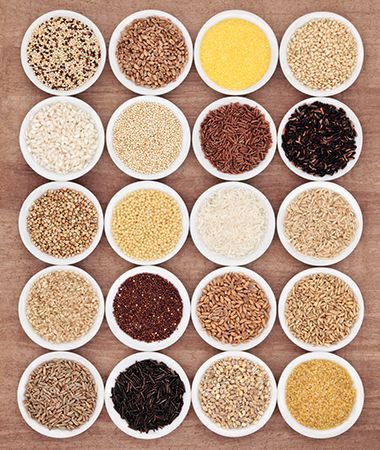Coeliac disease is considered a type of autoimmune condition of the intestinal wall. It is not an allergy as such, but does involve an immune-system response to foods containing gluten and tends to run in families. When food containing gluten (wheat, barley, oats, oat bran, rye) is consumed, an inflammatory cascade occurs in the gut, resulting in poor absorption of nutrients. Major symptoms include: mouth ulcers, 'gut upset', fatigue, anaemia, skin problems and weight loss. However, some people have no symptoms at all.
Coeliac disease differs from a wheat or gluten allergy, which can cause facial swelling, red rashes and welts or a wheat or gluten intolerance, which can cause bloating and abdominal discomfort when eaten. In coeliac disease, gluten needs to be completely avoided and cannot be introduced back into the diet. If gluten is not eliminated, it may lead to osteoporosis, chronic anaemia or bowel cancer.
Integrative medicine is an emerging field of medicine, whereby trained doctors combine evidence-based complementary medicine with standard medicine to assist a patient with coeliac disease. The goal behind integrative medicine is to achieve the best outcome for the patient in a non-invasive and natural way. Integrative medicine is recognised as a growing specialty of medicine and is particularly effective in helping patients with chronic disease, including coeliac disease, whereby a 'whole person' or holistic approach is needed.
Since coeliac disease is a condition that not only affects the intestinal wall but also can contribute to other disease processes in other organ systems, having an integrative practitioner treating this condition means that all facets of a patient's health is considered. So how can integrative medicine assist someone with coeliac disease?
Correct Diagnosis
It is important that coeliac disease is properly diagnosed and distinguished from other conditions that may mimic coeliac disease, such as: gluten and wheat allergy or intolerance, inflammatory bowel disease, parasite infection, irritable bowel syndrome and other conditions of gut wall inflammation.
An integrative practitioner will be able to correctly diagnose coeliac disease through a combination of screening blood tests, endoscopy and small bowel biopsy undertaken by a Gastroenterologist. Once coeliac disease is diagnosed, genetic testing may then be undertaken to determine the risk of genetic inheritance for other family members.
Other autoimmune conditions may co-exist with coeliac disease and need to be ruled out. These include pernicious anaemia, causing vitamin B12 deficiency, type - 1 diabetes, as well as autoimmune thyroid conditions. These are diagnosed clinically, as well as screening blood tests. Coeliac disease will present with conditions other than a digestive complaint, such as: mouth ulcers, skin rashes or by nutrient deficiency signaled in blood testing. An integrative practitioner is trained to sort through these atypical presentations of coeliac disease so a correct diagnosis is not missed.
Effective Treatment
The treatment for coeliac disease is avoidance of all gluten. This may involve patient education on food products that may contain gluten, including processed or packaged foods.
An integrative practitioner will undertake this process and will repeat coeliac blood testing in three-six months, to ensure gluten has been consistently removed from the diet. A repeat endoscopy and small bowel biopsy is often undertaken twelve months after the initial diagnosis, to ensure gut wall repair.
Management of Symptoms
Although the definitive treatment for coeliac disease and thereby resolution of symptoms, requires abstinence from all gluten in the diet, there can be an intermediate delay in symptom recovery. This is due to the time taken for the gut wall to heal. However, symptoms of food upsets can also extend to other foods, such as those containing lactose, as well as short-chain carbohydrates found in some fruits and vegetables, legumes and starches. This may therefore involve educating the patient as to which foods to limit until the intestinal wall has completely healed to avoid bloating and abdominal pain.
Fatigue is a common symptom of coeliac disease and may be due to gut wall inflammation and the resultant nutrient malabsorption. For this reason, it is important to rule out concomitant conditions, such as iron deficiency anaemia, vitamin B12 deficiency, folate deficiency, as well as zinc deficiency resulting from malabsorption. Treatment of these conditions with additional supplementation can lift energy levels.
On the occasion where gut wall inflammation is so severe that oral supplementation with either tablets, powder or liquids is not improving levels of the above vitamins and minerals in blood testing, alternate routes of administration may be prescribed by an integrative practitioner. This may include; iron and B12 injections, as well as zinc topical cream applied to the skin.
Additionally, other supplementation may be prescribed to assist in symptom resolution and gut wall recovery. This may include: prescription of digestive enzymes to assist with breaking down of food to avoid further malabsorption, boswelia used to assist with gut wall inflammation, as well as glutamine and aloe vera. All of these have been shown to be of some clinical benefit in assisting patients in achieving complete gut wall recovery.
Overall effective treatment of coeliac disease involves a whole person approach, whereby all facets of a person's health is considered and not just the one disease process that may be the most obvious. Integrative medicine bridges the gap between complementary and standard medicine providing an effective way to assist someone with coeliac disease by offering a treatment approach that is safe, evidence-based and as natural as possible.

By Dr Cris Beer

